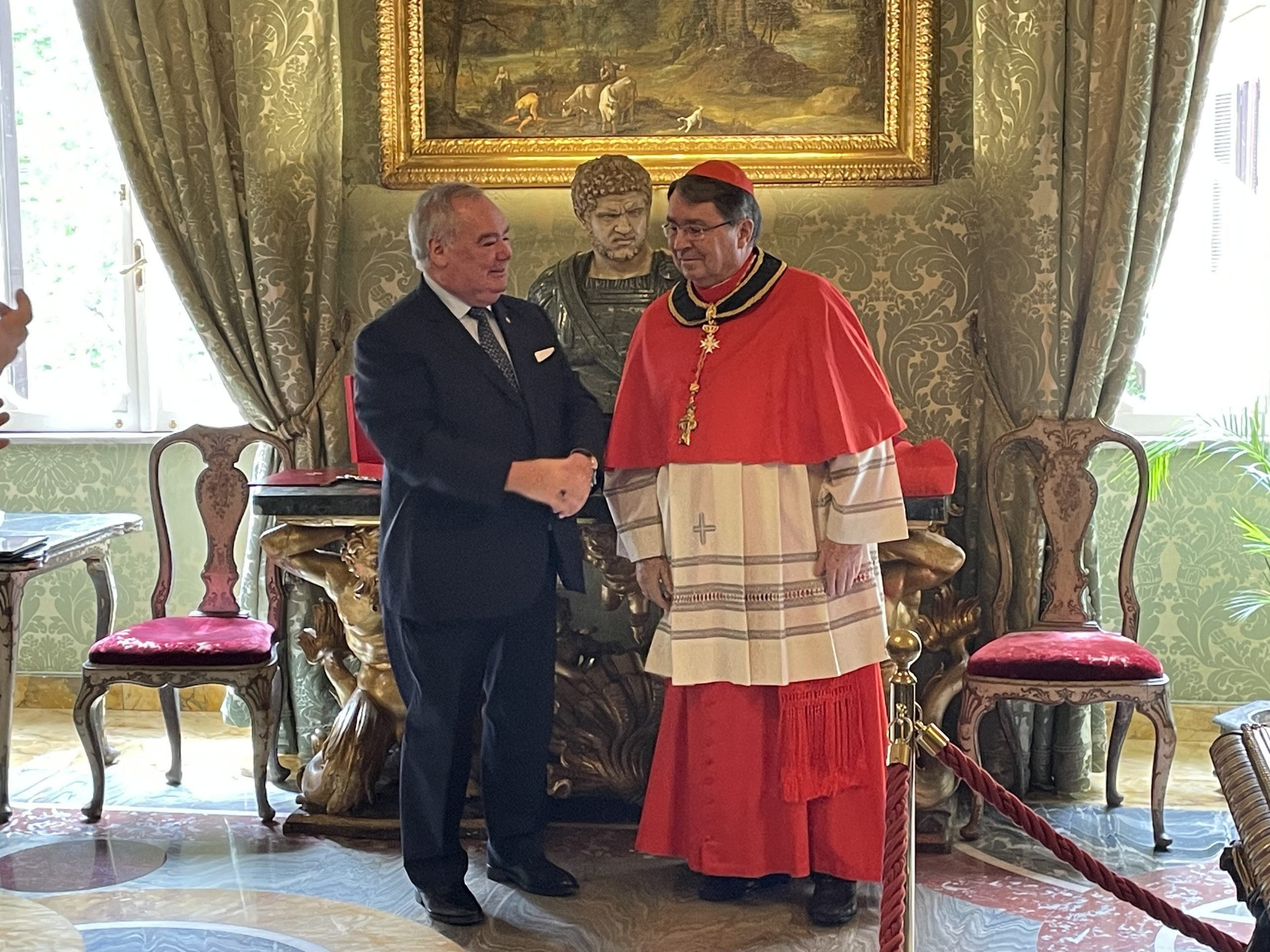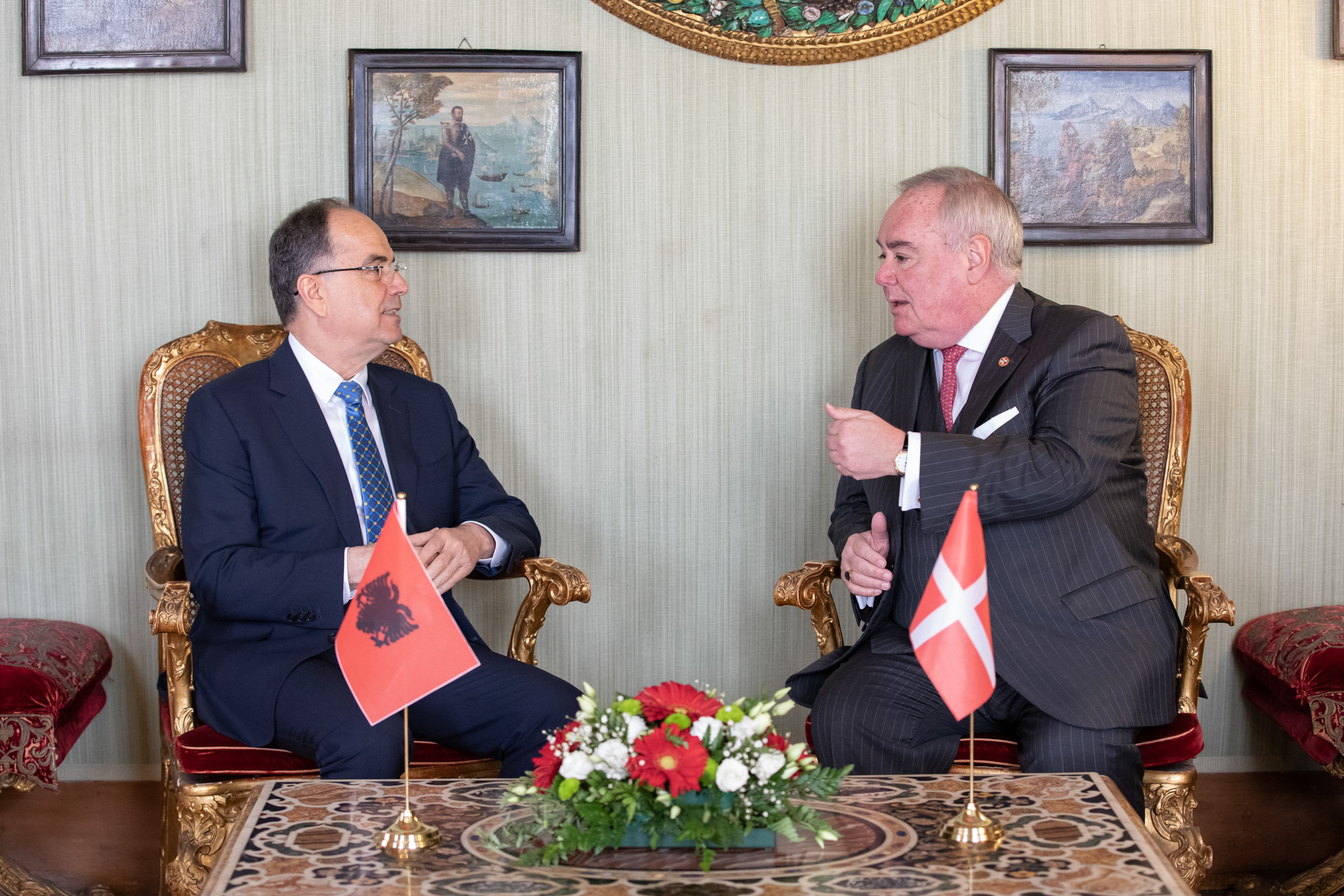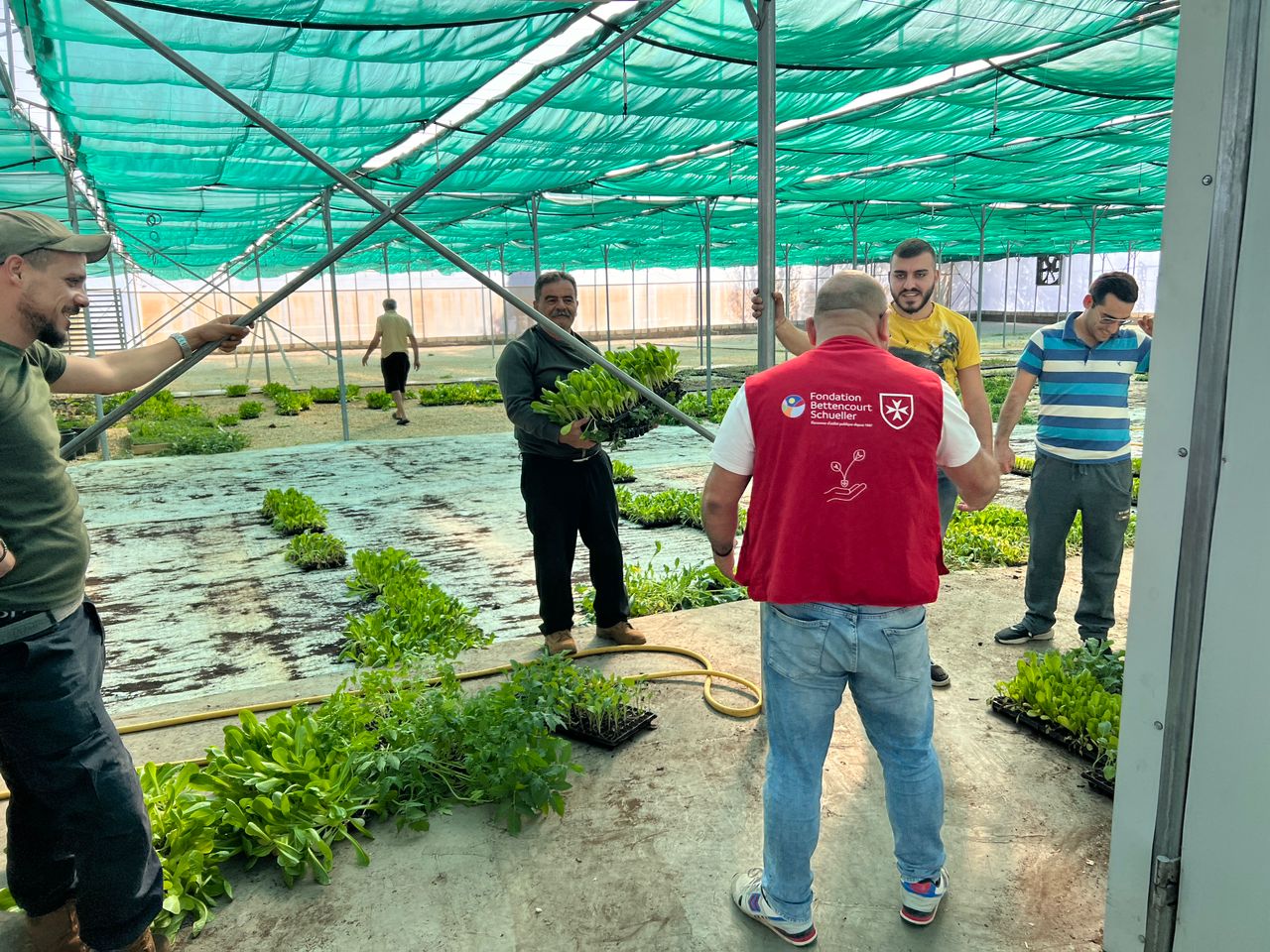The “Orient-Le Jour” of the 8th of June
‘The Lebanon belongs to the cradle of civilization and Christianity and we are proud of the action carried out by the Order of Malta in this country.’
With a perpetual smile on his lips, Count Jacques de Liedekerke, Grand Chancellor of the Sovereign Military Order of Malta (i.e. Minister of the Interior and Foreign Minister) describes his sentiments towards our country where his institution can count on a very active association and an embassy. His presence, together with three government colleagues of this sovereign State, but with no territory and therefore no frontiers, concluded the works of the chairmen of the Order’s National Associations who met in Beirut on 4th-5th June at the Hotel Riviera. ‘We were touched by the warm welcome we received in this country’, Count Jacques de Liedekerke emphasised once more. The Count, in an interview that was granted to L’Orient-LeJour, touched upon issues such as initiatives undertaken by his organisation throughout the world, the dialogue between civilizations and the significance of his journey to the Lebanon.
Count de Liedekerke is a Belgian lawyer who founded an international office in Brussels and Antwerp. He joined the Order of Malta in 1985 and, since 2002, has been Grand Chancellor.
‘We are not a political power’, Count de Liedekerke points out in answer to a question concerning the circumstances that determine possible interventions of the Order of Malta and its political influence in the world. ‘We are a humanitarian institution of Christian persuasion since we are all practising Catholics. Our position has been one of neutrality since the founding of the Order 900 years ago. We take care of the needy, regardless of race, colour, sex or creed. Such an attitude in the Middle Ages was considered avant-garde.’
Therefore, the knights of the Order of Malta are not interested in politics. However, ‘political repercussions at a humanitarian level interest us directly, even if we never express our opinion about the actions that may be at the origin of a particular situation.’ What happens when their activity is hindered by dramatic circumstances? Reply: ‘In this case we appeal to international institutions to exert pressure.’
How can one govern a State with no territory? ‘Our sovereignty is of a particular nature and permits us to be present in all countries where we have the respect and authority enjoyed by States.’ points out Count de Liedekerke, ‘Our activity is eminently humanitarian, has no frontiers and, therefore, those who carry out actions in our name do so exclusively to serve our cause. This is the ideal that we promote and which characterises the activities carried out in various countries.’
There are ten thousand knights of the Order of Malta all over the world: more than 3,000 in Latin America and more than 5,000 in Asia. ‘These are countries where Christianity is not as old as in the two main continents where we have our roots.’ he notes.
‘Mysticism has never turned back in the world’
Christianity has its roots in the Middle East. ‘The first hospital was founded in Jerusalem, run by the knights of Malta at the end of the 11th century.’ Count de Liedekerke points out. ‘The Order endeavoured to continue its mission despite the historical vicissitudes. However, Christians abandoned Palestine and the knights established themselves on Cyprus, Rhodes, Malta and, nowadays, in Rome. We have, however, always tried to remain close to our roots. In the Lebanon we have a structure of which we are very proud and in Bethlehem there is a hospital very close to our hearts which is still standing in spite of the events that are shaking the country.’
Is the Order of Malta considering extending its influence to Eastern countries? Can it establish itself in countries where the Catholic church has very few, if any, followers? ‘Our mission is to assist those in need, regardless of their religion’, recalls the Grand Chancellor, ‘However, in order to set up a stable association, there must first be a Christian community to provide us with the necessary number of knights. If this is not possible, then we proceed directly by sending missions that have been formed in other countries, but we also have the assistance of our local ambassador who organises aid. We take advantage of all possibilities. The fact that we are a sovereign State allows us to have direct means of intervention all over the world.’
How would you qualify the activities carried out by the Order of Malta in the West where Christianity has fewer followers than in the past? ‘The knights are chosen from among people of faith, profoundly convinced that they have a spiritual and moral task to perform.’ He states that, ‘It is true that in several European countries the Faith has become less diffuse, but this does not mean that, at an international level, religious spirit is in decline. Mysticism is much more widespread than is commonly thought. There again, when we see that our ideals are under attack, we defend them with even more enthusiasm.’
When the Lebanon was chosen as the venue for the meeting, the Grand Master (equivalent to the President of the Republic) requested that four other high-ranking officials take part (the ministers with the most important appointments) and this was the first time in the history of the Order of Malta that anything of this kind has occurred. What is the reason behind these exceptional measures and what does the Lebanon represent in the strategy of the Order of Malta? ‘The Lebanon is not only the cradle of civilization, but also Christianity and the monotheistic religions’, underlines Count de Liedekerke, ‘Consequently, it is a country to which the Order of Malta, an originally European institution, is deeply attached. It is also a country with a civil and Christian tradition. It is a country that has suffered terrible trials and for these reasons we felt the need to offer our assistance. This is why we are particularly committed to developing our hospitaller activities in the Lebanon.’
‘We are witnesses not tourists’
The Count goes on saying: ‘We are very proud of what has been achieved here, not only by the Lebanese knights, whose work is admirable, but also by other generous people from other countries, who together provide financial aid and the human resources necessary for what is, today, one of our most beautiful achievements.’
Will there possibly be more support or more substantial financial assistance to the Lebanese mission in the future? ‘The help that can be offered to people suffering in misery can never be sufficient,’ he states with a smile. ‘We will never have done enough. However, the means at our disposal are not unlimited. Our sources of financing are not boundless, whereas our area of action is immense. For each country we arrange for timely assistance that allows our intervention in exceptional cases or catastrophes. If we could assure more substantial aid to the Lebanon we would, but it must be made known that this aid is, in itself, important.’
Upon being asked to provide some data, the Minister pointed out that more than 200,000 medical operations are carried out each year in the Lebanese centres. In reply to the question whether the government of the Order of Malta was directly financing all this, he stated that, ‘these activities are financed mainly by the funds gathered by the Order, but other contributions must be considered, and in particular the co-operation offered by the Lebanese authorities with whom we have excellent relations.’
The is the Grand Chancellor’s first visit to this part of the world. But this does not prevent him form ‘closely following the dramatic events that occur in this region.’ ‘Consequently,’ he adds. ‘we have not come as tourists, but as witnesses in an attempt to bring you comfort and assure you of our understanding in light of the difficulties which you are called upon to face’.
What role can an institution such as the Order of Malta play today in bringing the positions of East and West closer to one another? ‘We are not a political might, but we do have a certain moral power. We believe that our intervention would not be possible if only one side asked us to help them in opening up a dialogue. We will carry out our humanitarian activities with no set political aspirations and without passing judgement on the causes that have led to tragedy.’
Count de Liedekerke participated at the meeting together with the venerable bailiff Fra Ludwig Hoffmann Von Rumerstein, Grand Commander (responsible for spreading the principles of Faith), bailiff Albrecht Freiherr Von Boeselager, Grand Hospitaller (responsible for the hospital activities in the world) and the Marquis Gian Luca Chiavari, Receiver of the Common Treasure (Minister of Finance), and thirty chairmen of National Associations of the Order from five continents. It is the first time that the four ministers, the so-called ‘High Offices’, have travelled together to take part in this type of meeting which is held every two or three years.
Suzanne Baaklini










